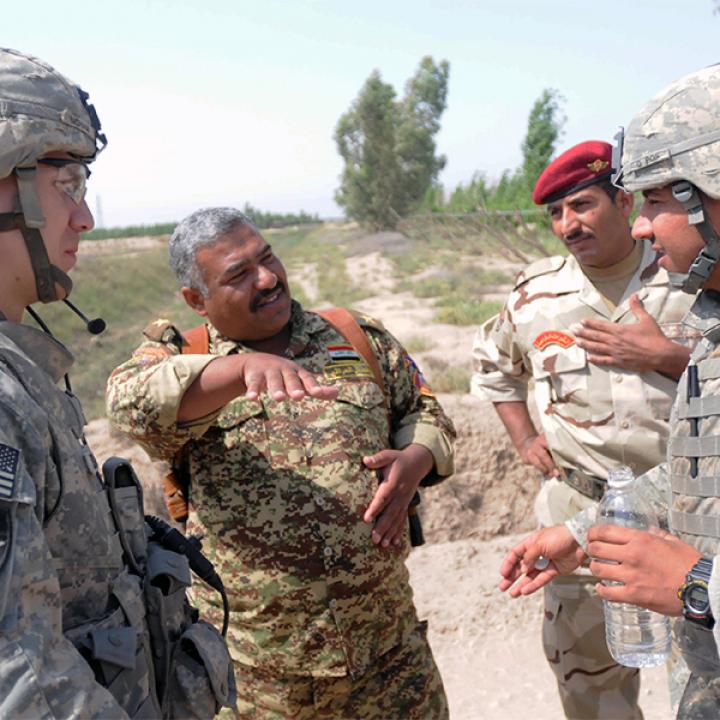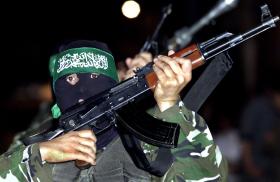
- Policy Analysis
- PolicyWatch 2812
Preventing Allies from Fighting Each Other in Iraq's Disputed Areas

As the Islamic State attempts to regenerate in tense multiethnic areas, Washington should view Arab-Kurdish dispute resolution as an essential counterterrorism mission, not an uncertain nation-building enterprise.
Tension is building between Kurdish and Iraqi security forces in the country's disputed territories, many of which are claimed by both Baghdad and the Kurdistan Regional Government (KRG). Following previous armed standoffs in Tuz Khormatu and northern Diyala province, a race is now developing west of Mosul between Peshmerga forces and the Popular Mobilization Units, the predominantly Shia armed volunteers used by the Iraqi state to augment its military. Thus far, PMUs have seized a string of Yazidi towns along the Syrian border that are claimed by Baghdad but were policed by the Kurds prior to the 2014 Islamic State (IS) offensive.
If these trends are left unchecked, history could repeat itself. The Islamic State's forebear, al-Qaeda in Iraq, was militarily defeated during the U.S. "surge" in 2006-2007 and scorched down to its roots by relentless U.S.-led counterterrorism operations in 2008-2010. But after American forces withdrew, the movement quickly rebounded, changed its name, and eventually seized nearly a third of Iraq. This regeneration happened first and fastest in the multiethnic frontier between the KRG and the Arab areas of northern Iraq. The reason was simple: lack of trust between Iraqi and Kurdish security forces. Without the trilateral U.S.-Kurdish-Iraqi patrolling agreement -- the Combined Security Mechanism (CSM) -- large swaths of the north became Sunni Arab demilitarized zones where neither federal nor Peshmerga forces had full control, allowing IS to fill the void. The latest developments in these areas are a timely reminder that the war to finish the group off in Iraq could easily morph into a territorial struggle between America's allies, creating the conditions for another IS comeback.
A FESTERING DISPUTE
Iraq's Disputed Internal Boundary (DIB) stretches between the Syrian and Iranian borders, spanning fifty of the country's hundred districts. All of these disputed areas are south of the so-called Green Line, the post-1991 boundary between government-controlled portions of Saddam Hussein's Iraq and the KRG. And in each case, Kurds and other non-Arab minorities claim that they have been unfairly displaced and discriminated against. Since Saddam's fall in 2003, Erbil and Baghdad have jockeyed for advantage in many of these areas, particularly oil-rich Kirkuk, with the Kurds usually gaining the upper hand in local security and administration. The parties have yet to make use of the agreed settlement mechanisms laid out in Article 140 of the Iraqi constitution -- census, resettlement, and referendums on administrative final status. The resulting competition has contributed to severe instability and human suffering in DIB districts.
To help resolve the dispute, the international community has played a vital role as an honest broker on many occasions. After 2003, the U.S.-led coalition functioned as an undeclared peacekeeping force for eight years until the U.S. withdrawal. American military leaders intervened to deescalate large mobilizations by Baghdad and the Kurds along the disputed line in 2008 and 2011. The United States also created the CSM to establish joint patrols along the multiethnic crease, recognizing that terrorist groups preferred to operate out of such disputed zones. Meanwhile, the UN Assistance Mission for Iraq (UNAMI) undertook on-the-ground investigations of local grievances and conditions, producing detailed recommendations for confidence-building efforts in each DIB district.
THE ISLAMIC STATE TAKING ADVANTAGE
In July 2016, the coalition brokered an agreement to ease tensions between Iraqi and KRG security forces in the lead-up to the battle for Mosul. But the agreement was exceedingly vague: the Kurds believed it gave them permission to move back into any liberated zones they controlled before 2014, while Baghdad believed it would freeze Kurdish front lines once the KRG's involvement in the Mosul battle ended (which wound up being October 2016).
The difference in interpretation is becoming critically important as PMUs take over Qahtaniyah and other Yazidi towns that the Kurds once policed. On May 12, PMUs launched a long-awaited attack into IS territory west of Mosul near the Syrian border. Their commanders, led by Iranian proxy and U.S.-designated terrorist Abu Mahdi al-Muhandis, seemingly began the operation with the Iraqi government's foreknowledge but did not give the KRG any warning.
Previously, the Kurds had noticed a disturbing pattern when other disputed districts were liberated, including Sinjar, Tuz Khormatu, Daquq, Mosul, Khanaqin, and the Ninawa Plains. In each of these areas, PMUs began setting up local security units recruited from the Yazidi, Turkmen, Christian, and Shabak minorities (and even Shia Kurds). In fairness, many groups accuse the KRG of precisely the same behavior in Kurdish-held DIB districts. Whatever the case, foreign states are being drawn into these areas: Iranian proxies are operating within some PMUs south of Sinjar, while Turkey has readied military jets, drones, and special forces to strike Syrian Kurdish and Yazidi militias just north of the city. Given the rising tensions, it is no surprise that IS cells are already regenerating in places where rival security forces are distracted by each other's moves, such as northern Diyala, the Hamrin Mountains, Tuz Khormatu, and southern Kirkuk.
U.S.-LED CONFIDENCE-BUILDING EFFORTS
To achieve its goal of fully defeating IS, the Trump administration will need to rethink the way it manages Iraqi-Kurdish tensions -- and the sooner the better. At the strategic level, the National Security Council's current review of Iraq policy should commit real focus and real resources to help stabilize Sunni Arab and mixed-ethnicity DIB districts. UNAMI's recommendations on the matter should be dusted off and reexamined in light of recent changes, including a newfound willingness among many liberated Sunni Arab communities to give Iraqi and Kurdish forces the benefit of the doubt. In addition, locally recruited PMUs that reflect the indigenous ethnosectarian and tribal mix could be included in the effort to prevent another IS insurgency. But it is vital that these paramilitaries be detached from the influence of Iranian proxies such as Muhandis.
At the operational level, the U.S.-led Combined Joint Task Force-Operation Inherent Resolve should plan a long-term advise-and-assist mission to sustain Iraqi-Kurdish security coordination around Yazidi towns (e.g., Qahtaniyah), the Turkmen city of Tal Afar, the multiethnic Ninawa Plains, and Arab districts such as Hawija. U.S. advisors already on the ground can play an active role in detecting when local allies attempt to undermine each other in disputed areas, potentially giving coalition partners enough warning to ameliorate the risk via diplomatic action. U.S. officials should also assess whether and how intelligence collection systems, drones, and coalition advisors could replicate some of the CSM's pre-2011 capabilities.
Without such efforts, armed conflict could break out between Washington's Iraqi and Kurdish allies, to the Islamic State's benefit. Such fighting would also give Iran room to stir tensions between Baghdad and Erbil, raise the public profile of its own Iraqi militia proxies, and complicate the KRG's campaign for greater sovereignty. Given the consequences of inaction, restarting the internationally backed process to permanently resolve the DIB issue is not just some "nice to have" side goal of U.S. policy in Iraq. Rather, it is a vital aspect of any strategy for permanently defeating IS and leaving the group no neglected corners in which to regenerate.
Michael Knights is a Lafer Fellow with The Washington Institute and author of its 2016 report "How to Secure Mosul." He has worked in all of Iraq's provinces and spent time embedded with the country's security forces.



